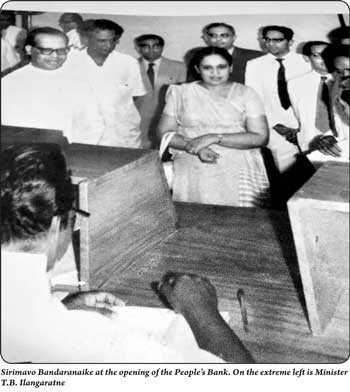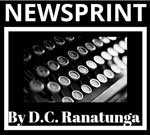Friday Feb 20, 2026
Friday Feb 20, 2026
Saturday, 1 June 2019 00:10 - - {{hitsCtrl.values.hits}}
 The Government set up in 1960 July with Sirimavo Bandaranaike as Prime Minister continued the nationalisation policy and the media had an exciting time. A significant change was the nationalisation of the American and British owned oil companies and the setting up of the Ceylon Petroleum Corporation as a State-Owned Entity. Insurance was also nationalised.
The Government set up in 1960 July with Sirimavo Bandaranaike as Prime Minister continued the nationalisation policy and the media had an exciting time. A significant change was the nationalisation of the American and British owned oil companies and the setting up of the Ceylon Petroleum Corporation as a State-Owned Entity. Insurance was also nationalised.
In 1961 the People’s Bank was opened in a bid to popularise the banking habit among the rural folk.
Food shortages forced the Government to impose food rationing in 1964 with just a year for the next general election.
In the same year a proposal to nationalise Lake House newspapers created a division in the Government with a number of Government MPs resigning. This resulted in the Government losing its majority in Parliament and a general election being called.
As the election campaign began, the Lake House management was keen to see that the UNP wins. The ‘Dinamina’ policy was to maintain a neutral policy and ensure that the readership is maintained rather than be partisan and lose readers, resulting in a drop in circulation.
The management did not agree and Editor M.A. de Silva resigned. Along with him the brilliant writer B.A. Siriwardena also resigned. He joined the ‘Aththa,’ the Communist Party daily which increased its readership overnight after he started writing the editorial and other feature articles.
Denzil Pieris, Editor of the Observer, moved in as Acting Editor on the ‘Dinamina’.
The 1965 general election saw the 18-year-olds getting the right to vote. The change occurred after 34 years. Since 1931 only those over 21 could vote. Those eligible to vote jumped from 3,724,507 (1960) to 4,710,887 – almost a one million increase. The number of polling booths increased from 3,664 to 4,771.
Among other changes was the recognition of political parties by the Election Department. For recognition there had to be at least two party candidates who had served as MPs earlier, or the party had to prove that they had been active during the past five years. Nine parties were recognised on that basis.
Being the only candidates for the two-member Colombo South electorate two party stalwarts – J.R. Jayewardene (UNP) and Bernard Zoysa (LSSP) – were elected uncontested. This was the first time that there was no election for an electorate since H.S. Ismail was elected uncontested for Puttalam seat at the 1947 general election.
Another noteworthy feature was the high turnout at the election. In certain electorates the percentage rose to 82.
Restrictions in the use of vehicles made most voters either use public transport, walk or use their own vehicles to get to the polling stations. The CTB strengthened its fleet to assist the voters.  However, most of them were seen walking to the polling booths.
However, most of them were seen walking to the polling booths.
Mrs. Bandaranaike resigned from the Senate and contested the Attanagalle seat and won it by a majority of 16,535 votes, defeating three other contestants. Three more females – Kusuma Rajaratne (Jathika Vimukthi Peramuna – Uva Paranagama), Shiva Obeysekera (SLFP – Mirigama) and Wimala Kannangara (UNP – Galigamuwa) – also won.
Winning 66 seats the UNP formed the Government and Dudley Senanayake became Prime Minister for the third time.
After the election, D. Wettasinghe, Editor of the ‘Janata,’ the Sinhala evening daily, was appointed Editor of the ‘Dinamina’. Denzil P. wanted me to move over to the ‘Observer’ as News Editor. It was a new experience, having served a Sinhala daily for nine years. I later functioned as Features Editor and Manik de Silva took over as Head of the News Desk.
My active career as a journalist ended in 1969 when I moved to Lever Brothers as Brand Manager of toilet soaps. One year later I shifted to CTC as Communications Manager where I served until retirement.